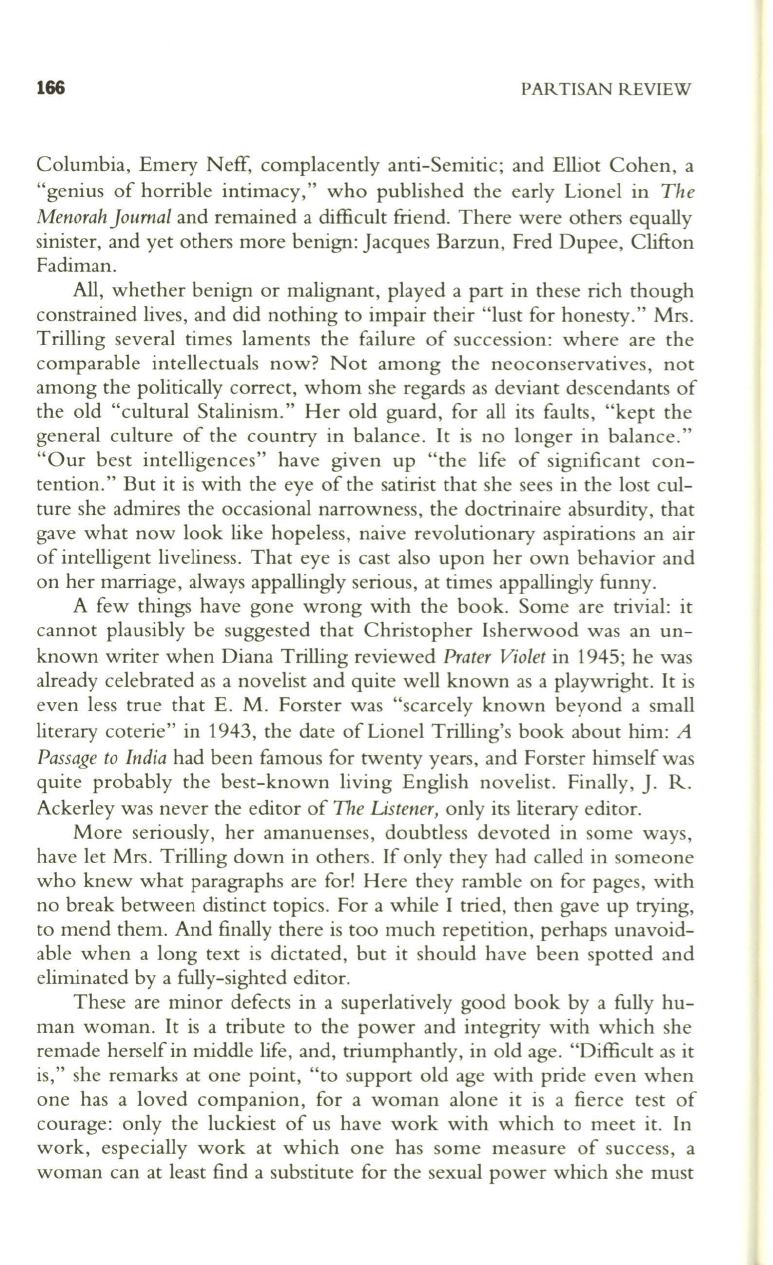
166
PARTISAN REVIEW
Columbia, Emery Neff, complacently anti-Semitic; and Elliot Cohen, a
"genius of horrible intimacy," who published the early Lionel in
The
Menorah Journal
and remained a difficult friend. There were others equally
sinister, and yet others more benign: Jacques Barzun, Fred Dupee, Clifton
Fadiman.
All, whether benign or malignant, played a part in these rich though
constrained lives, and did nothing to impair their "lust for honesty." Mrs.
Trilling several times laments the failure of succession: where are the
comparable intellectuals now? Not among the neoconservatives, not
among the politically correct, whom she regards as deviant descendants of
the old "cultural Stalinism." Her old guard, for all its faults, "kept the
general culture of the country in balance. It is no longer in balance."
"Our best intelligences" have given up "the life of significant con–
tention." But it is with the eye of the satirist that she sees in the lost cul–
ture she admires the occasional narrowness, the doctrinaire absurdity, that
gave what now look like hopeless, naive revolutionary aspirations an air
of intelligent liveliness. That eye is cast also upon her own behavior and
on her marriage, always appallingly serious, at times appallingly funny.
A few things have gone wrong with the book. Some are trivial: it
cannot plausibly be suggested that Christopher Isherwood was an un–
known writer when Diana Trilling reviewed
Prater Violet
in 1945; he was
already celebrated as a novelist and quite well known as a playwright. It is
even less true that E. M. Forster was "scarcely known beyond a small
literary coterie" in 1943, the date of Lionel Trilling's book about him:
A
Passage to India
had been famous for twenty years, and Forster himself was
quite probably the best-known living English novelist. Finally,
].
R.
Ackerley was never the editor of
The Listener,
only its literary editor.
More seriously, her amanuenses, doubtless devoted in some ways,
have let Mrs. Trilling down in others. If only they had called in someone
who knew what paragraphs are for! Here they ramble on for pages, with
no break between distinct topics. For a while I tried, then gave up trying,
to mend them. And finally there is too much repetition, perhaps unavoid–
able when a long text is dictated, but it should have been spotted and
eliminated by a fully-sighted editor.
These are minor defects in a superlatively good book by a fully hu–
man woman. It is a tribute to the power and integrity with which she
remade herself in middle life, and, triumphantly, in old age. "Difficult as it
is," she remarks at one point, "to support old age with pride even when
one has a loved companion, for a woman alone it is a fierce test of
courage: only the luckiest of us have work with which to meet it. In
work, especially work at which one has some measure of success, a
woman can at least find a substitute for the sexual power which she must


